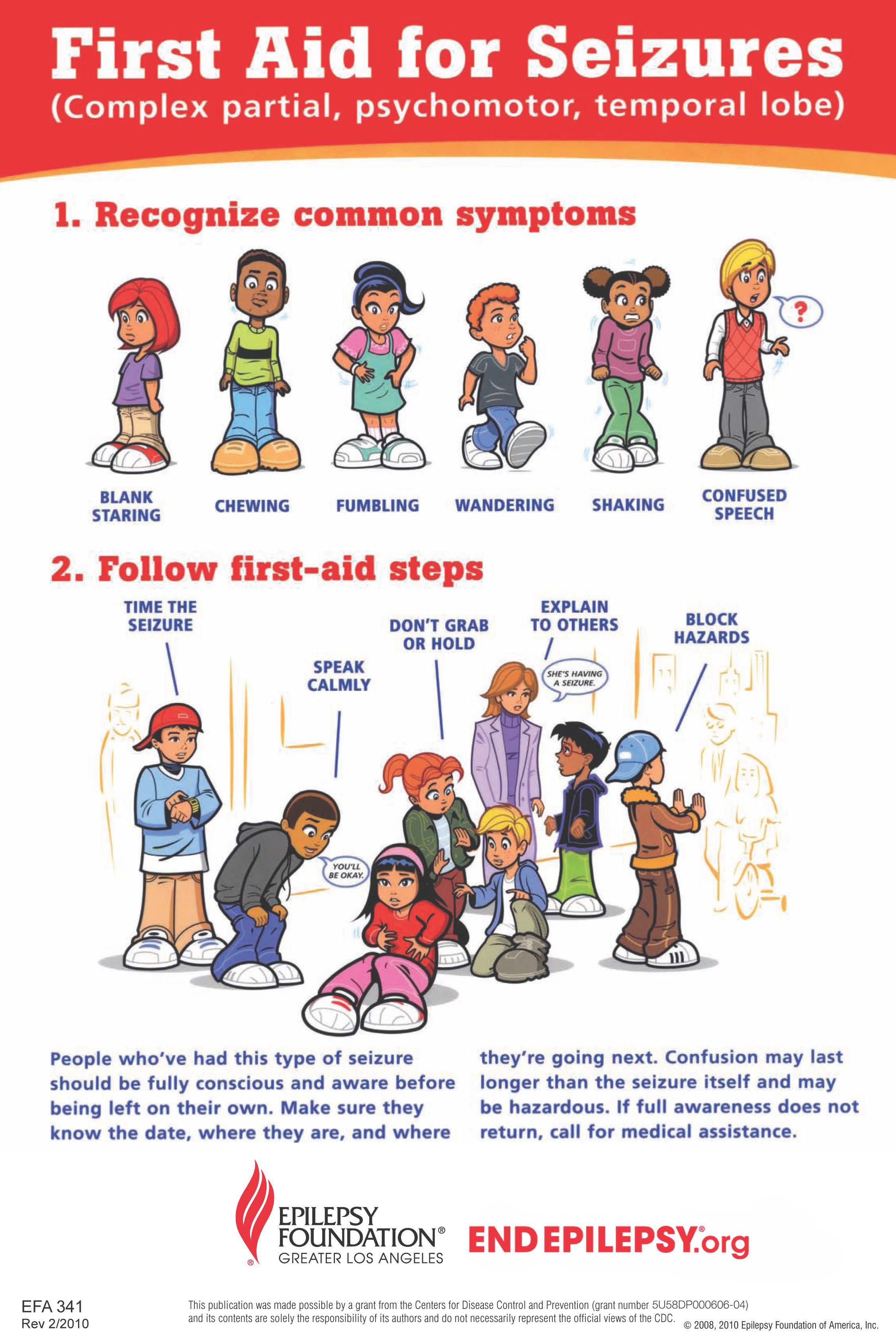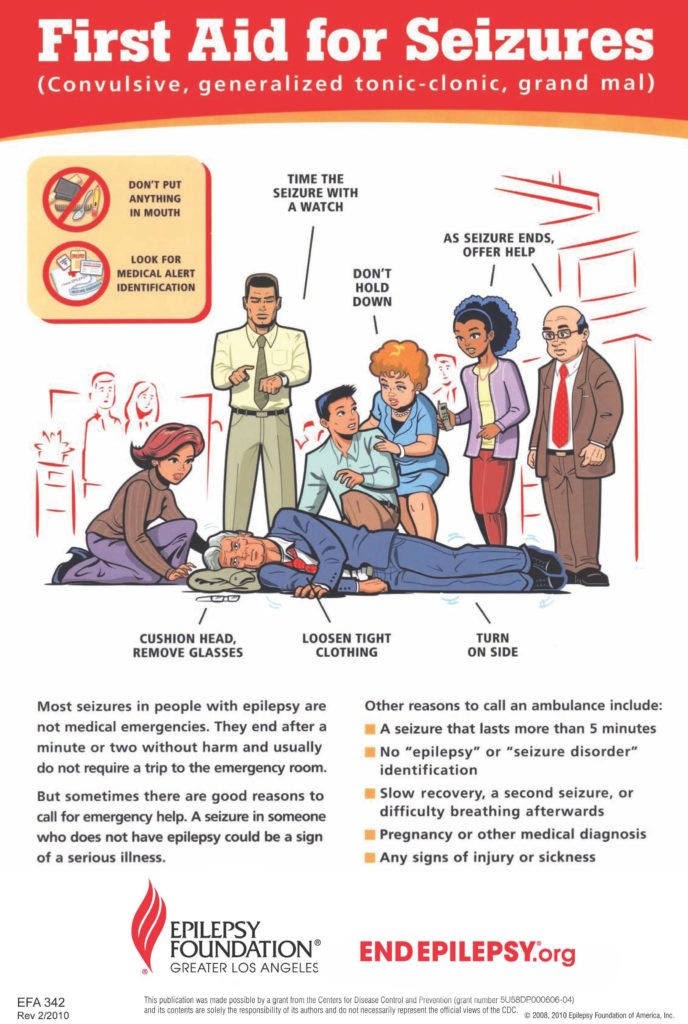
25 Jun First Aid for Seizures – English
You need to know this if you have been diagnosed with epilepsy
- Consult an epilepsy specialist.
Every seizure is not epilepsy. If you have repeated seizures despite being on medications, ask your doctor for referral to appropriate specialist with additional training in epilepsy. Neurologist and neurosurgeons tend to have greater experience with seizures and epilepsy.
- Educate your friends and loved ones with basic first aid.
When you experience a seizure, you have to depend on the quick actions of the people around you. Make sure family members, coworkers, and anyone else you spend time with all understand first aid basics for epilepsy. Educate them on the steps to take if they’re with you during a seizure. Tell them to move you to a safe place, to check your breathing, to protect your head, to clear the scene of dangerous objects, and to turn you with your mouth faced down. Advise not to restrain you during a seizure and not to put anything into your mouth. Tell them to call for ambulance, if your seizures last more than 5 minutes, occur back-to-back or closer together than normal, breathing is difficult, or if an injury may have occurred.
- Help yourself by being regular on medications and follow-up
Non-compliance to medications remains the commonest cause for recurrence of seizures. To maximize the benefits of your seizure medication, make sure you know your exact dosage, when you need to take it, and whether you need to take your medication with food or on an empty stomach. Talk to your doctor about possible side effects, as well as whether a generic medication will work for you, or if you require a name brand for your treatment. Finally, ask if you need routine blood tests for monitoring, and find out when and how often you need to follow up with your doctor

- Follow these steps to decrease your risk of additional seizures.
In addition to taking your medication regularly, you can decrease your risk of recurrent seizures by keeping a healthy daily routine. Eat nutritious foods, though talk to your doctor before starting a diet or weight loss program. Some diet plans, such as Atkins, can interfere with anti-seizure medications. Getting a good’s night sleep is important, as lack of rest or frequent awakenings can trigger seizures. Regular exercise can help prevent a number of seizure medication side effects, like weight gain and decreased bone density. (Let your doctor know about any significant weight changes, as this may impact your anti-seizure drug levels.) Don’t use alcohol, tobacco or other drugs, and avoid any flashing lights, including videogames or strobes, that are known to trigger your seizures.
- Don’t worry, if medication doesn’t work, you may benefit from surgery.
Most patients are able to get their seizures under control with anti-seizure medicines. However, if you’re among those who do not achieve good control with anti-seizure medication, your epilepsy specialist may discuss with you various surgical options.
In a resective brain surgery, the part of the brain causing seizures is removed, while other surgical procedures may instead interrupt the brain pathway that allows seizures to spread.
Vagal nerve stimulation involves placing a device that sends electrical impulses to the vagus nerve, a part of the nervous system that controls breathing, heart rate and other bodily functions not under your voluntary control. A vagal nerve stimulator can relieve seizures by regulating these impulses, acting like a pacemaker for the brain.
- Maintain a seizure diary.
Keep track of the time of the seizure, the behavior of the person during the seizure as well as after the seizure, anything that immediately preceded the seizure (such as eating or showering). This is useful to give to the neurologist and to try to track any seizure “triggers.” Seizures are not usually predictable so it is comforting to know I can “prepare” for the morning seizure. Probably one of the worst things about seizures is not knowing when they will strike. If anything, the log will allow you to look back to see if there are patterns to the seizures.
All you have to do, is to maintain a dedicated notebook with each page dedicated for a month. One side of the page write down your medications with dosage and on the opposite side, write days in the month. Document number of seizures in each day.
- Seek help, if you’re feeling stressed about epilepsy
Inform your physician that you are feeling stressed about your condition. Discussing your disease and removing certain misconceptions about epilepsy would ease your stress. Also, they would be able to guide to appropriate therapy for stress relief. Relaxation techniques like yoga and mediation would help to reduce your stress levels and increase your overall quality of life. You can also get advice and support from local epilepsy associations. These groups can help with some of the day-to-day challenges of epilepsy, like dealing with insurance companies, work- related issues, and stress on relationships with friends and family.
- If you are planning to get married, seek your physician’s counsel with your proposed life partner.
Due to social taboo, may persons with epilepsy go unmarried. This could be avoided if the you could discuss your disease and your marriage plan with your epileptologist. It would be prudent to bring your future life partner for counsel with your physician. This would remove doubts and apprehensions from their minds.
- If you want to get pregnant, talk to your doctor first.
Most women with epilepsy can become pregnant, but it’s best to plan your pregnancy with your doctors so you and your medical team can prepare for any special needs. Make sure your epilepsy doctor and ob/gyn work well together, and that your ob/gyn is comfortable and familiar with epilepsy.
As with any pregnancy, it’s important to start taking prenatal vitamins and folic acid before becoming pregnant. You will also need to optimize your epilepsy treatment before trying to conceive, as fluctuating hormones may require frequent changes in your medical treatment. Your doctor may also recommend changes to your anti-seizure medications.
- Breast feed your child after discussing with your physician.
As a new mother, breastfeeding is possible, but should be discussed with your medical team early. Additionally, you need to talk with your medical team about how epilepsy may impact you as a parent, and any specific steps you’ll need to take when you bring your baby home.


No Comments